#FEMALEFORWARDINTERNATIONAL
The most powerful weapon to change the world
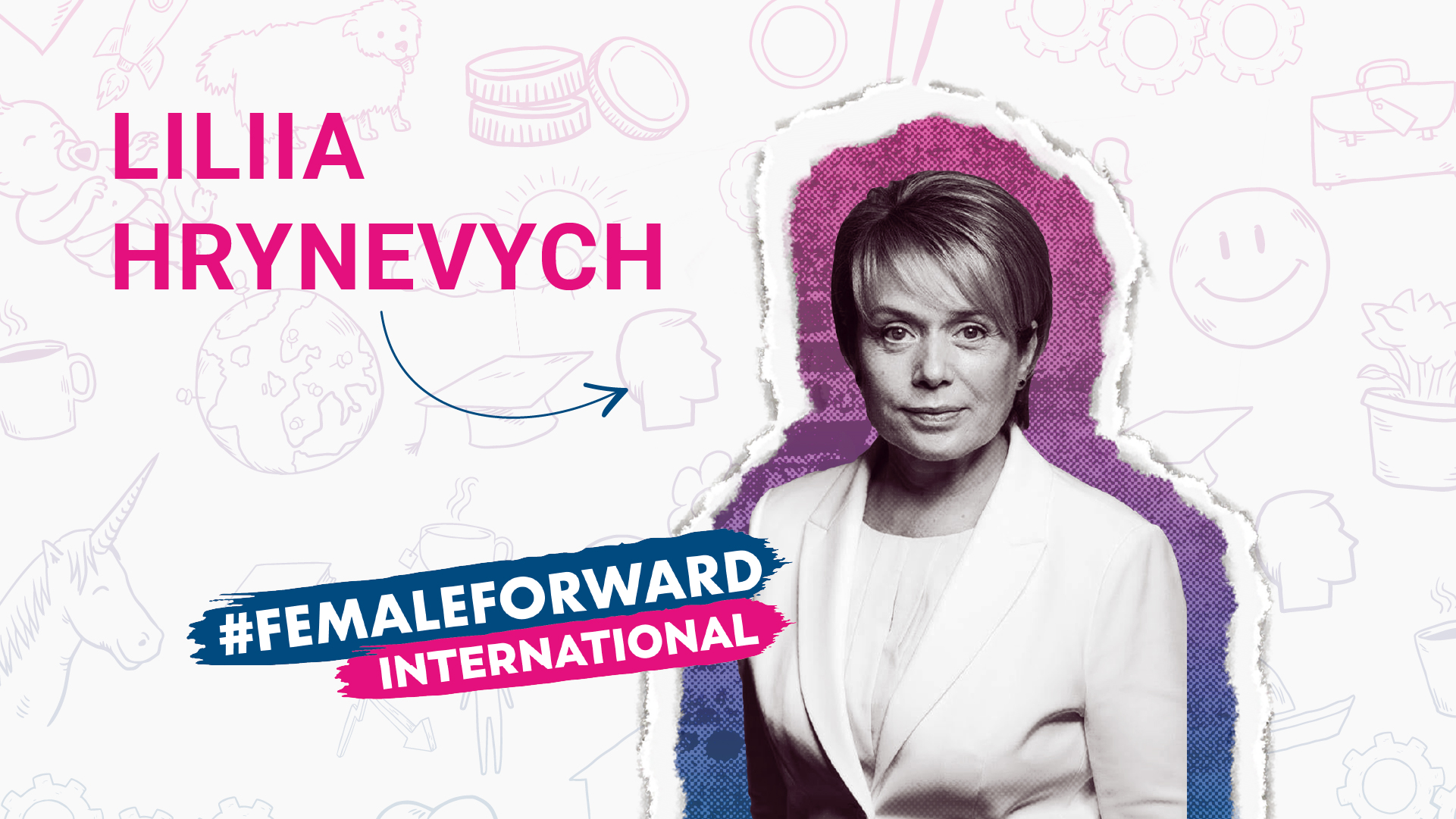
It was a hot summer day in August. Liliia Hrynevych took a taxi and the driver was in a particularly good mood. "My daughter has become a student in the Medical University”, he beamed. “She will be the first doctor ever in my family”.
Up until this point, this man couldn’t dream of this moment, because the university admission system in Ukraine was corrupt. Working families like his couldn’t afford to pay a bribe to get their children into university and even talented kids didn’t stand a chance of pursuing higher education.
What changed the game was the system of external independent testing that Liliia Hrynevych helped get introduced in Ukraine as the first director of the Ukrainian Center for Educational Quality Assessment. Thanks to it, the taxi driver’s daughter could pass her entrance examinations and apply to higher educational institutions.

Stories like this prompted Hrynevych, a former teacher and a school principal, to pursue a career in public policy. There she could address and fight the corruption she experienced first-hand working in the educational system.
A firm believer in Nelson Mandela’s motto that education is the most powerful weapon which you can use to change the world, Liliia Hrynevych used her authority to engage others and managed to transform the old, Soviet style school system into one where every child is encouraged to form and defend its own ideas. As the first female Minister of Education in the country, Hrynevych initiated a broad and systemic reform which created more open and democratic schools.
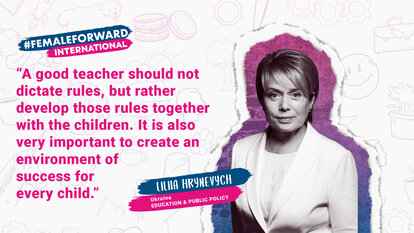
She spent three years in office (2016-2019) as part of the government of Volodymyr Groysman, but it was her long and productive career before this role that enabled her to make such a difference. She laid the foundations for this reform while working as chair of the parliamentary committee on education, adopting legislative initiatives that allowed changes both in the school system and in academic research. Prior to that, she led the creation of independent external testing for university admissions.
“I think all of my professional life has prepared me for these positions where I could achieve something”, Hrynevych says, reflecting on her experience. “If I hadn’t worked as a teacher or as a school principal and then as the director of a department of education, I would not have been able to conceive of such fundamental reforms”, she adds.
Bringing the change to schools in Ukraine
Liliia Hrynevych first started teaching in 1988, when Ukraine was still part of the Soviet Union and the main goal of the educational system was to raise typical Soviet citizens.
It was certainly not an environment that valued the individual approach or teacher freedom. “The most important thing at that time was not to look different from the others and to be like a regular part of the machine”, Hrynevych remembers.
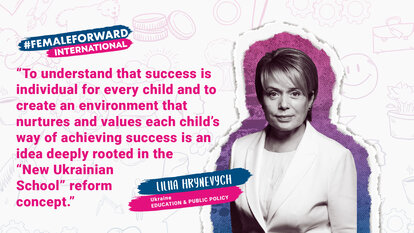
A third-generation teacher herself, she enjoyed working with children immensely and it was important for her to be their friend. As a young teacher, she drew her inspiration from the ideas of the Ukrainian humanistic educator Vasyl Sukhomlynsky. He used to say that a child’s success is a source of internal strength and energy, which the child could then use for future studies.
To understand that success is individual for every child and to create an environment that nurtures and values each child’s way of achieving success is an idea deeply rooted in the “New Ukrainian School”, a concept that Liliia Hrynevych introduced with her reformation efforts.
It reflects on the changing role of school in the new dynamics of the technologically advanced world. The school is no longer the only place one can get knowledge, it is rather an environment where children are taught how to study, to form their own ideas and develop their own role in society. In other words, school is supposed to teach children how to use their knowledge to solve life’s problems.
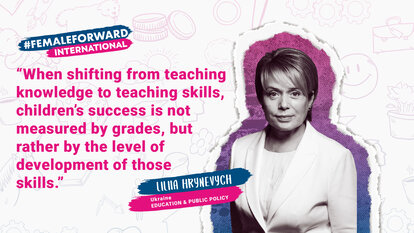
As Liliia Hrynevych explains, the “New Ukrainian school” concept placed an emphasis on values, competencies, and soft skills; it taught children the art of emotional intelligence, how to cooperate with each other, and to not give in to problems.
“A child should be able to form its own thoughts, to argue those thoughts and to be able to defend one's position, rather than just comply with the orders coming from the top”, she points out and adds: “And a good teacher should not dictate rules, but rather develop those rules together with the children.”
While the old system would set standards for what every child should know or be able to do, the new one evaluated the ability to use this knowledge and to put it into practice. This idea was linked with the change in the culture of assessment. Before, the teachers would focus on pointing out a child’s mistakes. Now, their approach was to point out the things they should learn. When shifting from teaching knowledge to teaching skills, children’s success is not measured by grades, but rather by the level of development of those skills.
This required a lot of energy from the teachers, but it also yielded very good results, Hrynevych believes. It also demanded that teachers work with a different methodology, one that was oriented towards group effort and encouraged children to express their ideas. It values discussions, active listening, and working on projects.
Being able to implement this change and shift society’s mindset that children need to be taught differently than previous generations was a huge endeavour, but Liliia Hrynevych said that riding on the momentum of the Ukrainian revolution helped them a lot. “The Revolution of Dignity that took place in Ukraine in 2014 and the events after that changed the value system of very many people”, Hrynevych says. “It opened up a huge window of opportunity. That's why we were able to start this reform, to adopt the education and reform laws, because it was a voice people could hear. The system that used to suffocate new ideas suddenly collapsed and society now demanded new ideas and had new opportunities”, she adds.
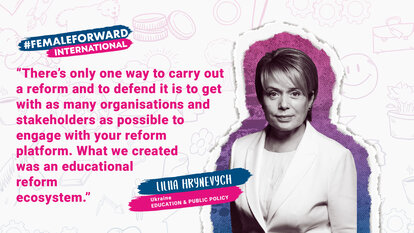
Getting the teachers on board
But as a teacher herself, Hrynevych also knew that the success of the reform depended largely on their efforts to get the teachers on board with their plan.
There were 440 000 teachers in Ukraine with an average age between 45-48 years old, which meant that the majority were experienced teachers with an already formed mindset. The reform meant updating the educational content, the curriculum, and the methodology that they were teaching.
“We would always find that about 10% of the people were always actively pro-reform. We would always find about the same number of people who do not want any change. Our job was to propose to the remaining 80% of the people, who were just sitting there and looking at where the boat was headed, a programme of change that they would adopt”, Liliia Hrynevych explains.
This meant setting clear goals for the reform and communicating them very well to the teachers.
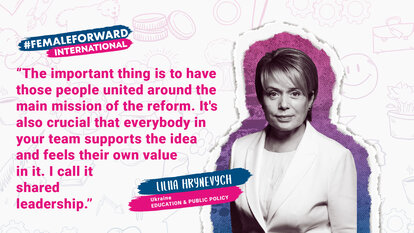
And because no reform is possible without investments, during Hrynevych’s time as a minister, direct funding for the school system and its infrastructure was increased twofold. The pay package for teachers grew 50% when the reform started. Every teacher was offered the possibility to advance their qualification level and those who got certified received bonuses. Liliia Hrynevych points out that she was lucky in this sense because education was one of the government’s priorities from the very beginning.
But what truly ensured the success of the reform was her team’s efforts to create a network of parents, teachers, opinion leaders, and civil society organizations that understood the value of this educational reform, believed in their vision for its implementation, and supported it publicly.
“The only way to carry out the reform and to defend it is to get as many stakeholders as possible to engage with your reform platform. What we created was an educational reform ecosystem”, Liliia Hrynevych exemplifies.
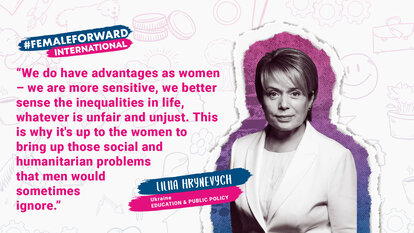
“The second important thing is to be able to explain to society, to all those interested, and even to those who are not interested, why you want to carry out this change. It is very important to find the people who are hesitant and turn them into your advocates”, she explains.
This, of course, doesn’t mean that Hrynevych didn't face any criticism while trying to implement the reform. But having this support network ensured that her life work will continue even after her time in office is over. The civil society organisations she engaged with have kept working and pressing the current administration to ensure that the reform works properly.
The former minister says that when you work on something so fundamental, you inevitably get attacked by other people and the only way to survive this is to really have faith in what you’re doing.
“When they start criticising you, when you start reading all sorts of true or untrue things in social media, when people start using that derogatory tone that they use against politicians, then you really have to have a lot of energy and faith in order not to give up”, Hrynevych says.
Never give up and never not learn
Liliia Hrynevych is not the type of person that likes to take all the credit for her administration’s accomplishments.
“Clearly I didn’t do everything myself. It wouldn’t be possible for one person to do that because it’s a very broad, systemic change”, she says. What she did though was to gather a team of professionals who shared the same values.
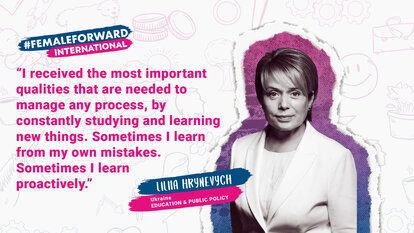
The important thing is to have those people united around the main mission of the reform and then to correctly distribute their roles”, Hrynevych believes. “It's also crucial that everybody in your team supports the idea and feels their own value in it. I call it shared leadership”, she adds.
Hrynevych believes that her role as a leader was to be the face of the idea and to share the responsibility. Of all the qualities needed in someone people want to follow, Liliia points out her determination to constantly study and learn new things.
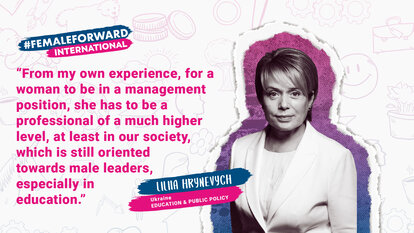
As a woman, a mother, and the first female leader in her position as a minister, she believes that in order to succeed as a woman in management, you have to be a professional at a much higher level. Especially when in the public eye, it is essential for a woman leader to never forget to look after herself.
Liliia Hrynevych’s advice for the next generation of women in leadership is to be the best professionals in whatever they do, to learn to defend their position, and to never, ever give up.
